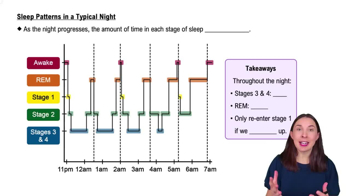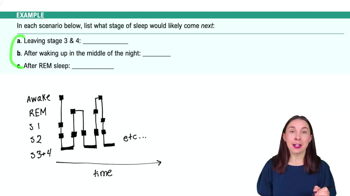Table of contents
- 1. Introduction to Psychology1h 43m
- 2. Psychology Research2h 20m
- 3. Biological Psychology2h 41m
- 4. Sensation and Perception28m
- 5. Consciousness and Sleep32m
- 6. Learning41m
- 7. Memory34m
- 8. Cognition37m
- 9. Emotion and Motivation35m
- 10. Developmental Psychology33m
- 11. Personality48m
- 12. Social Psychology41m
- 13. Stress and Health41m
- 14. Psychological Disorders44m
- 15. Treatment47m
5. Consciousness and Sleep
Sleep
Struggling with Psychology?
Join thousands of students who trust us to help them ace their exams!Watch the first videoMultiple Choice
Which of the following statements about the circadian rhythm is true?
A
It consists of the changes in a person's heartbeat throughout the stages of sleep.
B
It is a cycle controlled by the hippocampus.
C
It is a cycle that takes about a day to complete.
D
It is when most dreams occur.
 Verified step by step guidance
Verified step by step guidance1
Understand the concept of circadian rhythm: It is a natural, internal process that regulates the sleep-wake cycle and repeats roughly every 24 hours.
Identify the key components of circadian rhythm: It is primarily influenced by external cues like light and temperature, and is controlled by the suprachiasmatic nucleus in the hypothalamus, not the hippocampus.
Evaluate each statement: The first statement about heartbeat changes is incorrect as circadian rhythm is not specifically about heartbeat changes during sleep.
Consider the second statement: The hippocampus is involved in memory, not in controlling circadian rhythms, making this statement incorrect.
Analyze the third statement: The circadian rhythm indeed takes about a day to complete, making this the correct statement. The fourth statement about dreams is incorrect as dreams are associated with REM sleep, not directly with circadian rhythm.

 3:25m
3:25mWatch next
Master Circadian Rhythms with a bite sized video explanation from Hannah Gordils
Start learningRelated Videos
Related Practice


































































































![Race, Genes and IQ Differences | Bret Weinstein [Mini Clip]](https://img.youtube.com/vi/IztL_m3pd70/mqdefault.jpg)



































































































